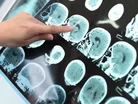UCSF awarded grants to study Alzheimer’s disease

Two individual groups of UC San Francisco researchers have been awarded Allen Distinguished Investigator (ADI) grants of more than $1 million each, according to the school.
The grants were awarded from The Paul G. Allen Family Foundation to “understand the cellular machinery underlying the neurodegenerative effects of Alzheimer’s disease.”
RELATED TOPIC: This is how we can end mental health stigma around the world
In patients with Alzheimer’s disease, dying brain cells accumulate clumps of proteins that are tough to dissolve. The mystery researchers are trying to solve is why neurons fail to dissolve these molecules.
Aimee Kao, MD, PhD, assistant professor of neurology, and her collaborators Diane L. Barber, PhD, professor and chair of the Department of Cell and Tissue Biology, Matt Jacobson, PhD, professor of pharmaceutical chemistry and Torsten Wittman, PhD, associate professor of cell and tissue biology, aim to use their three-year ADI grant of $1.3 million to test cellular pH.
RELATED TOPIC: The failing stigma and treatment of mental illness
“Most people, including myself, would say…the pH changes are simply a reflection of the poor health of the neurons,” said Kao. “Our hypothesis now is that the pH changes are an earlier event in the development of disease.”
On a separate, three-year, $1.4 million ADI grant, Michael Keiser, PhD, assistant professor of pharmaceutical chemistry, Martin Kampmann, PhD, assistant professor of biochemistry and biophysics, and David Kokel, PhD, assistant professor of physiology, plan to combine three innovative techniques at the Institute for Neurodegenerative Diseases to understand how networks of genes and proteins drive Alzheimer’s disease.
Using a “systems pharmacology” approach, the group plans to analyze 500,000 drug compounds to understand how they influence networks of genes controlling disease processes in cells. They also plan to use functional genomics and a zebrafish model of Alzheimer’s disease to understand how cells handle neurodegenerative processes.
RELATED TOPIC: Mental health care sees largest expansion to date, still faces obstacles
“Few researchers in the field so far have combined such broad, unbiased views of what the cell might be doing when it’s trying to deal with these neurodegenerative processes,” said Keiser.
Read the latest edition of Healthcare Global magazine!
[SOURCE: UCSF]
- Pharma, AI & the US: This Week's Top Healthcare StoriesTechnology & AI
- McKinsey: How AI is Addressing the Mental Health CrisisTechnology & AI
- Converge International Leading way in Omnichannel TelehealthDigital Healthcare
- 48% of women say work has a negative impact on mental healthDigital Healthcare





